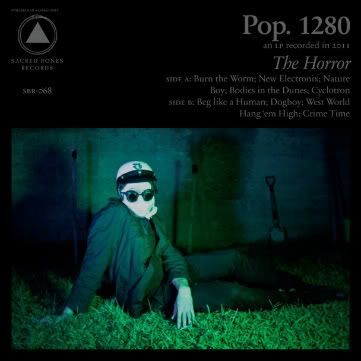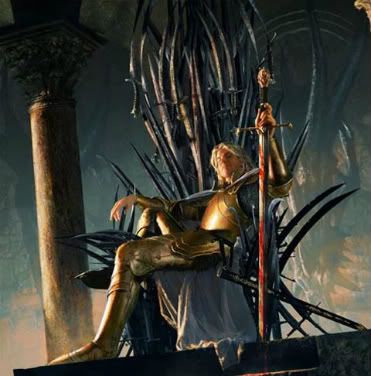 The Kingslayer
The KingslayerI have very much the same defensive angry nerd reaction to fantasy as I do towards
science fiction. When a friend or someone else I respect recommends that I read something ("A Song of Ice and Fire") or watch something ("Battlestar Galactica," "Firefly," etc.) that falls into either one of these two genres, my back immediately gets all up in a fighting stance. What do you mean, I'll
like it? I'm not THAT guy. Why would you think that? I mean, sure, I had a mullet in high school and I was in the marching band and I didn't go to any of the school dances and I played Dungeons and Dragons for way longer than I'm comfortable admitting...but
really? "
Battlestar Galactica"? Come on! My favorite movie is "Apocalypse Now." I rocked so hard at death metal concerts in college that this one time I needed
surgery afterwards! I used to have a mohawk, for fuck's sake! I shoot guns sometimes! I interviewed the drummer from Slipknot! I hung out on the guy from Coal Chamber's tour bus! "Firefly"? Whatever. You might as well suggest I should dive into the "Star Trek: Voyager" DVD set. No fucking way. I'm not gonna watch some bullshit about spaceships and robots, and I sure as shit am not gonna read some nerdy crap about swords and princesses and dragons and whatever else. Give me a good gangster movie any day of the week. The mullet is long gone. I haven't played a video game in years. I've had hot girlfriends. My ears are pierced. So no WAY I'm that guy!
I say all this to explain how it is that I've finally come to the sad realization that I really, REALLY need to get over myself.
Over and over again I've found myself having to eat crow once I actually do sit down and watch or read one of these things. I finally gave "Firefly" a shot last year. Brilliant. "Battlestar Galactica"? One of my favorite shows of all time.
This whole "Game of Thrones" phenomenon seemed way beyond me for the longest time. I'd been told of it ("really, Scotty, you'll
like it..."), but I'd managed to pretty much avoid the whole thing. And then HBO had to go and make a show. And all the critics had to go and rave about it. And all the sudden everyone had to tell me, again, how brilliant the books are. How gritty and dark and real. Seriously, Scotty, you'll like it.
Ugh.
I watched a YouTube teaser trailer for the first season of "Game of Thrones" with deep suspicion. This sure looks like bullshit nerdboy fantasy to me, I thought. Why is that blonde chick wearing furs? Oh crap, that's the dude from "Lord of the Rings". Jeez, now they're sword fighting. That other chick sure looks like a princess. I don't know...
But the critics kept raving, and the friends kept recommending. But
read the books first they said.
Damnit, so now this is going to have to be a
commitment.
Sigh.
Finally, back around the end of November, pretty much on a whim I decided to download "Game of Thrones" as an audio book. Thirty-three hours, it was. I could listen to it, an hour a day, at the gym. At the GYM. That's not too dorky, right? And if I don't like it I can just delete it from my iPod and pretend this sorry mummer's farce never happened.
If you're in the know, you can probably guess from that last sentence how things turned out.
I cruised through "Game of Thrones" in about a week. The whole "hour at the gym" thing fell apart when I then found myself driving around in circles for another five ("just one more chapter...") When I finished I had an actual panic attack that I hadn't yet purchased "A Clash of Kings." It took about a half-hour to download from Audible. Unacceptable. It was three in the morning, so I actually
sat there and stared at the little spinny icon thing on my computer until it finished. And then, at 3:30 a.m., I put on my headphones and started right up again.
It's about two months later, and I'm about a third of the way through "A Dance With Dragons." I almost feel like I'm emerging from some sort of solitary confinement, all haggard and bleary eyed and grateful for human contact (sort of like Reek emerging from Ramsey Bolton's dungeon...). I've had countless dreams about being on The Wall with Jon Snow and facing off against the Wights on the Fist of the First Men with Samwell Tarly, as well as several fairly embarrassing ones about Danaerys Targaryan and one really horrible one in which I was consumed by Wildfire while Varys the Eunuch stood by and laughed. When people talk to me in regular American accents, I don't quite know how to respond. I haven't even touched the HBO show yet. I'm actually a little terrified to watch it. If they screw it up, I might cry.
This is maybe my favorite series of books ever.
What Martin manages to do with "A Song of Ice and Fire" is what all good fantasy
should do, but what most that I've tried to read (which, admittedly, is not all that much since I got bored with the "Dragonlance" books in elementary school) don't: immerse the reader in a whole-world experience that, over time, begins to feel more real than his or her own. I feel -- between the books themselves and all the extra hours wasted on
A Wiki of Ice and Fire filling in the blanks -- that I probably know at least as much about the history and mythologies of Westeros and the lands of the East as I do about the Greeks, Romans, medieval Brits, etc. I can close my eyes and picture the geography of the Seven Kingdoms as clearly as I can that of North America.
But Martin goes much further than just that. Everything you've heard about how gritty and morally ambiguous these books are is absolutely true. My biggest problem with fantasy (and science fiction) are always the stock characters and the emphasis on high romance and heroics (I know, I know, I'm painting with too a broad brush and forgetting everything from "Blade Runner" to "Beowulf." I get it. Settle down). There's none of that here. Instead, we're given a world so rich as to be almost overpowering, rooted in the darkest sort of reality and populated with characters who either can't distinguish between right and wrong or who simply don't give a shit.
This is what I captured my grim cynic's heart about "Battlestar Galactica" when I finally sat down to watch it. Martin does it even better, and with an ear for dialogue and an eye for truly excruciating detail that the writer in me can only admire with awe and envy.
The story is so incredibly dense that I'm not even going to try to summarize it. I'll also do my best to avoid major spoilers, but if you haven't read the books or watched the series, beware.
Here are a few of my thoughts on each book:
1. "A Game of Thrones" (1996)
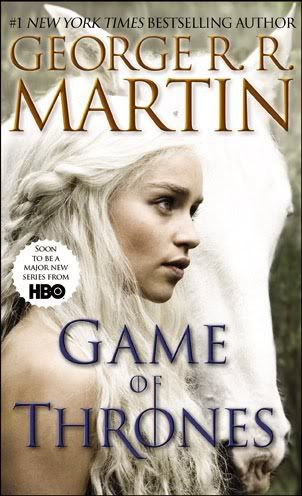 Oh, Dany...
Oh, Dany...The first book is one of the shortest and probably overall the simplest of the series. Even so, it's pretty sprawling. We're introduced to so many characters that, at times, I felt a little shell shocked (and, as I learned later, we only meet about half of the people who are going to matter here).
The book grabbed me from the prologue, where we see our first Other, and Chapter One, where we meet Bran and get to know the Starks of Winterfell. Right away, I could tell this wasn't exactly
fantasy fiction the way I've come to understand it. Sure, there are swords and Knights and Lords, but it reads more like historical fiction crossed with a good James M. Cain novel or Dashiell Hammett murder mystery. The sense of dread that Martin builds is as powerful and ominous as in any respectable horror story.
This is fantasy by way of
film noir. Heroes don't really exist in Martin's world ... but villains do. We come to love Eddard Stark and his unbending sense of honor, but about halfway through the book we want to slap him upside the head for his confounding obtuseness. Everyone else falls somewhere in the middle...except for Cersei and Jaimie Lannister, of course. Holy God. Are there any two characters more vile in the history of English letters? I can't think of them.
And then, of course, there's Tyrion. How can you not love Tyrion?
Defining moment: What Cersei made Eddard do to Lady. If I ever wished I could actually murder a fictional character, it was her in that moment.
2. "A Clash of Kings" (1999)
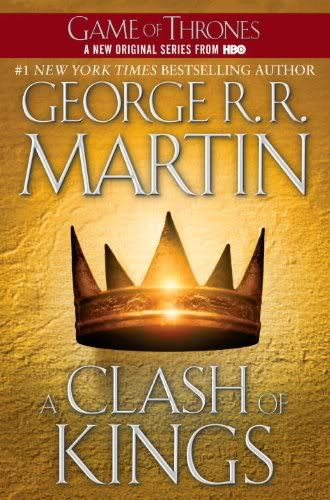
After the genuinely shocking conclusion to "A Game of Thrones," Martin takes us through the fallout in "Clash" at a leisurely (some might say grueling) pace. His War of the Five Kings very clearly shows how rooted his imagination is in actual medieval history rather than Gary Gygax-esque mysticism. I felt like I was experiencing, in real time, the Wars of the Roses that tore England apart. So far, there's still very little beyond the setting that is in any way fantastical. The dragons have barely been touched upon, and the Wights are still a complete and utter mystery. We have Bran's visions, but it's too early to tell what any of it means.
What I loved about this book is how deftly Martin sets up and then follows through with all the labyrinthine political and military conflicts. Everything that transpires -- from the North's rebellion, the courtship of Highgarden, to the invasion of the Iron Men -- feels completely logical and utterly true. Nothing is simple, allegiances aren't what they seem, and as the war progresses we begin to comprehend the full scope, horror and devastation of this sort of conflict. There is nothing heroic or romantic about any of it.
It's in this book where Tyrion really starts to come into focus as a character. The story of his first wife, Tysha, is heartbreaking, but it's not until we meet his father, Tywin, and see the two interact that we really start to understand the demons that drive the little man. But he's unquestionably a genius, of the most diabolical (and still lovable) sort. What he did with the Chain and the Wildfire...as much as I hated myself for it, I couldn't help but cheer.
Martin also very deftly dives into the gender roles of the day through his depictions of what happens to Arya Stark and her sister Sansa. Arya can only survive by pretending to be a boy, and Sansa is punished every day for being a girl. The abuse Sansa suffers at the hands of the Lannisters is nauseating. If I hated Cersei in the first book, I really hated Joffrey in this one. But the way Arya consistently gets the better of those who underestimate her is, by contrast, exhilarating. She's the most badass little 10-year-old in all of fiction, as far as I'm concerned.
At this point, I found the chapters focusing on Jon (on the Wall) and Dany (far in the East) as frustrating as they were entertaining. They're both interesting stories in their own right, but I got so wrapped up in the War for the Iron Throne that every time we cut away to either of them I was tempted to just skip that chapter and get back to Westeros.
Defining moment: what happens to Winterfell.
3. "A Storm of Swords" (2000)
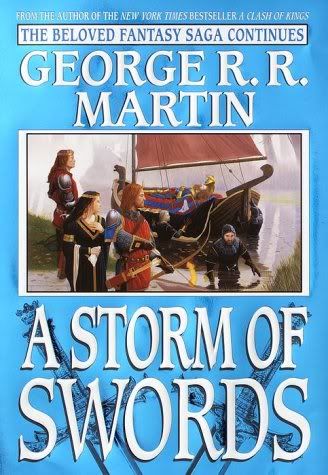
Long as it is, in some ways "A Storm of Swords" feels less like a book in its own right and more the
very extended conclusion to "Clash". When we pick things up, not a whole lot has changed for our major characters (save for Bran and Rickon). Jon's still on The Wall. Dany's still in the East. Sansa's still in the clutches of the Lannisters. Arya's still wandering the Riverlands, trying to find her way back home. And Robb, Catelyn, Stannis, and the Iron Men are still waging their bloody war against King Joffrey.
The most interesting -- and, to be honest, genius -- twist that Martin gives us is to finally introduce Jaime as a POV character. We've come to revile both him and Cersei over the course of the previous two books. Now, we get to see the world through Jaime's eyes. And suddenly things become much more complicated.
There's not too much I want to say about this book (in many ways, it's my favorite) because there's little I can say without giving anything precious away. It's by far the darkest of the series (and that's really saying something). What I will say is this:
1) Brienne of Tarth is a badass. And I really want to give her a hug.
2) We finally start to get a sense of how Dany and Jon's stories are going to relate to the larger drama.
3) The Red Wedding. Fuck me...
4) I kind of like Little Finger, despite myself.
5) Tyrion rules.
Beyond that, suffice it to say that, if this is in any way similar to the way the Wars of the Roses played out, I thank the Seven that I wasn't born until a millennia later.
Defining moment: The Red Wedding. Fucking hell. I haven't experienced anything near that upsetting since I read "American Psycho" while delerious with pneumonia.
4. "A Feast For Crows" (2005)
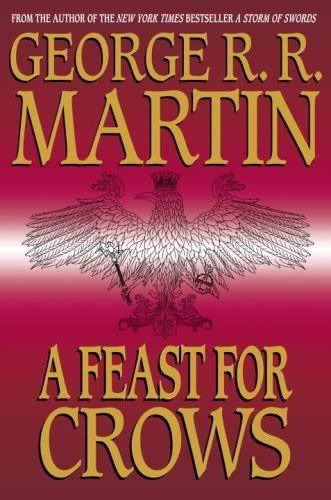
To understand why this book is so weird, you need to know a little about its publishing history. Originally, "Feast" and "A Dance With Dragons" were meant to be one book. The manuscript was so long that Martin's publisher insisted he divide it into two books. Instead of making the obvious choice of simply cutting it in half, he decided to separate them by character and location and then extensively rewrite both (this also lead to the long publishing delay that made so many of his fans howl with rage, apparently).
I understand why he did it the way he did, but unfortunately the result is that "Feast" is probably the weakest of the series. It's still good, but most of the characters we've come to really care about are either dead or are off somewhere out of sight, barely mentioned. Instead of Jon, Davos, Cat, Bran, and Tyrion, we're given Cersei, Jaimie, and Brienne as our main POV characters, with little jaunts off with the Dornish and the Iron Men. We do get a bit of Arya and Sansa, but they're mostly in the background (I'll get back to Arya in a minute).
We're mostly left with the dust settling from the War of the Five Kings. As is the case with most wars, the conclusion isn't nearly as satisfying as we might have wished. That's okay, because what Martin sacrifices in heroics and epic valor, he more than makes up in some truly chilling psychological realism.
After four books, we finally get to peak inside the head of Cersei. Whereas Jaimie becomes more sympathetic the more we get to know him, Cersei grows -- if possible -- even more vile. But she stops being evil for the sake of being evil. What Martin gives us is a truly unsettling look into the mind of an utterly damaged sociopath. Even scarier, we start to comprehend the cruel and twisted logic she uses to justify her increasingly horrifying actions. Cersei is someone who simply cannot exist without an enemy. Even when there are none to be found, she has to create them. And there's more than a little "Mommy Dearest" to her relationship with Tommen. To say any more would be to spoil some truly bone-chilling stuff.
For the first time, Arya's story feels a little superfluous. I'm not sure where Martin is going with this, but to be honest it's straining credibility. Again, I don't want to say much more.
I'm also not sure about the Lady Stoneheart subplot. It's interesting, but I have to admit that at this point it it feels like Martin's reaching. We'll see.
Try as I might, I just can't seem to care about what's going on in Dorne. I know it's going to be important, but we're four books in and it just feels too late for Martin to introduce this whole new culture and host of characters, particularly at the expense of the ones we're waiting to come back.
Defining moment: Cersei burning the Tower of the Hand.
5. "A Dance With Dragons" (2011)
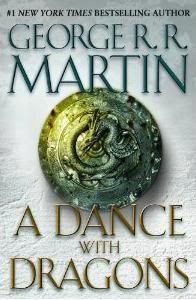
I'm only about a third of the way through this one, so I don't have too much to say about it yet. So far, at least, it seems to be an improvement over "Feast." I'm glad to be back with Tyrion, Bran, Jon and Dany -- particularly now that Jon and Dany's stories finally feel intrinsically tied to the whole story.
Defining moment (so far): Tyrion's plunge into the Rhoyne while battling the Stone Man. Or maybe Bran's first meeting with the Three Eyed Crow.
Can I just take a moment to bitch about the audio books? The first three were fantastic. But apparently there was a change in publishers, and even though they brought narrator Roy Dotrice (an English actor) back they've completely changed the pronunciation of names (Petyr Baelish and Catelyn Stark, most eggregiously) and the character voices. Arya and Dany now talk like withered old crones. Mellisandre sounds like Corky from "Life Goes On." The worst is Petyr. Dotrice had previously given him the silkiest, sleaziest drawl, barely above a whisper. Now he talks with Tywin Lannister's bluster.
WTF Random House?!? Why make these changes? Are you just trying to put your own stamp on the books? Then sack up and get a different narrator altogether. At least then the new voices would make sense.
